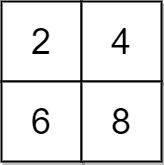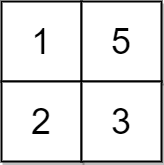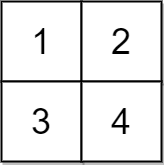LeetCode in Kotlin
2033. Minimum Operations to Make a Uni-Value Grid
Medium
You are given a 2D integer grid of size m x n and an integer x. In one operation, you can add x to or subtract x from any element in the grid.
A uni-value grid is a grid where all the elements of it are equal.
Return the minimum number of operations to make the grid uni-value. If it is not possible, return -1.
Example 1:

Input: grid = [[2,4],[6,8]], x = 2
Output: 4
Explanation: We can make every element equal to 4 by doing the following:
-
Add x to 2 once.
-
Subtract x from 6 once.
-
Subtract x from 8 twice.
A total of 4 operations were used.
Example 2:

Input: grid = [[1,5],[2,3]], x = 1
Output: 5
Explanation: We can make every element equal to 3.
Example 3:

Input: grid = [[1,2],[3,4]], x = 2
Output: -1
Explanation: It is impossible to make every element equal.
Constraints:
m == grid.lengthn == grid[i].length1 <= m, n <= 1051 <= m * n <= 1051 <= x, grid[i][j] <= 104
Solution
class Solution {
fun minOperations(grid: Array<IntArray>, x: Int): Int {
val arr = IntArray(grid.size * grid[0].size)
var k = 0
for (ints in grid) {
for (j in grid[0].indices) {
arr[k] = ints[j]
k++
}
}
arr.sort()
val target = arr[arr.size / 2]
var res = 0
for (i in arr.indices) {
res += if (i < arr.size / 2) {
val rem = target - arr[i]
if (rem % x != 0) {
return -1
}
rem / x
} else {
val rem = arr[i] - target
if (rem % x != 0) {
return -1
}
rem / x
}
}
return res
}
}

